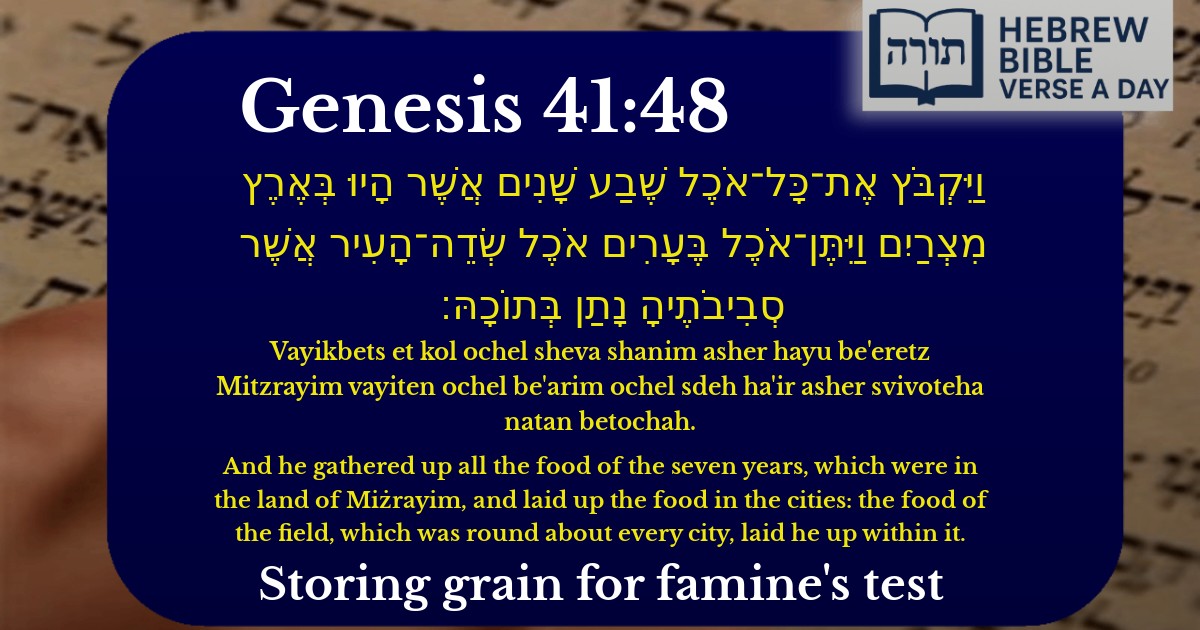Join Our Newsletter To Be Informed When New Videos Are Posted
Join the thousands of fellow Studends who rely on our videos to learn how to read the bible in Hebrew for free!
Hebrew Text
וַיִּקְבֹּץ אֶת־כָּל־אֹכֶל שֶׁבַע שָׁנִים אֲשֶׁר הָיוּ בְּאֶרֶץ מִצְרַיִם וַיִּתֶּן־אֹכֶל בֶּעָרִים אֹכֶל שְׂדֵה־הָעִיר אֲשֶׁר סְבִיבֹתֶיהָ נָתַן בְּתוֹכָהּ׃
English Translation
And he gathered up all the food of the seven years, which were in the land of Miżrayim, and laid up the food in the cities: the food of the field, which was round about every city, laid he up within it.
Transliteration
Vayikbets et kol ochel sheva shanim asher hayu be'eretz Mitzrayim vayiten ochel be'arim ochel sdeh ha'ir asher svivoteha natan betochah.
Hebrew Leining Text
וַיִּקְבֹּ֞ץ אֶת־כׇּל־אֹ֣כֶל <b>׀</b> שֶׁ֣בַע שָׁנִ֗ים אֲשֶׁ֤ר הָיוּ֙ בְּאֶ֣רֶץ מִצְרַ֔יִם וַיִּתֶּן־אֹ֖כֶל בֶּעָרִ֑ים אֹ֧כֶל שְׂדֵה־הָעִ֛יר אֲשֶׁ֥ר סְבִיבֹתֶ֖יהָ נָתַ֥ן בְּתוֹכָֽהּ׃
וַיִּקְבֹּ֞ץ אֶת־כׇּל־אֹ֣כֶל ׀ שֶׁ֣בַע שָׁנִ֗ים אֲשֶׁ֤ר הָיוּ֙ בְּאֶ֣רֶץ מִצְרַ֔יִם וַיִּתֶּן־אֹ֖כֶל בֶּעָרִ֑ים אֹ֧כֶל שְׂדֵה־הָעִ֛יר אֲשֶׁ֥ר סְבִיבֹתֶ֖יהָ נָתַ֥ן בְּתוֹכָֽהּ׃
🎵 Listen to leining
Parasha Commentary
📚 Talmud Citations
This verse is not quoted in the Talmud.


Context of the Verse
This verse (Bereshit 41:48) describes Yosef's implementation of his divinely inspired plan to store grain during the seven years of plenty in preparation for the seven years of famine. The verse emphasizes Yosef's wisdom in organizing the storage of food throughout Egypt.
Rashi's Commentary
Rashi explains that Yosef stored the grain in the cities where it was harvested ("the food of the field, which was round about every city"). This was a practical measure to prevent spoilage, as transporting large quantities of grain long distances would have been wasteful. Rashi also notes that Yosef stored the grain in the cities themselves ("within it") rather than in open fields, to protect it from animals and thieves.
Rambam's Perspective
In Moreh Nevuchim (3:50), Rambam highlights Yosef's administrative wisdom as an example of how divine providence works through natural means. Yosef didn't merely rely on miracles but implemented a systematic, logical plan to ensure food security - a model for proper governance.
Midrashic Insights
Halachic Implications
The Talmud (Ta'anit 10b) derives from this verse principles about communal responsibility for food storage. The Gemara notes that just as Yosef stored food "in the cities," communities must make provisions for times of scarcity, establishing this as a model for Jewish communal leadership.
Chassidic Interpretation
The Baal HaTanya sees in this verse a spiritual lesson: just as Yosef gathered physical sustenance during times of plenty to prepare for scarcity, we must gather spiritual "nourishment" during times of spiritual abundance to sustain us through difficult periods.